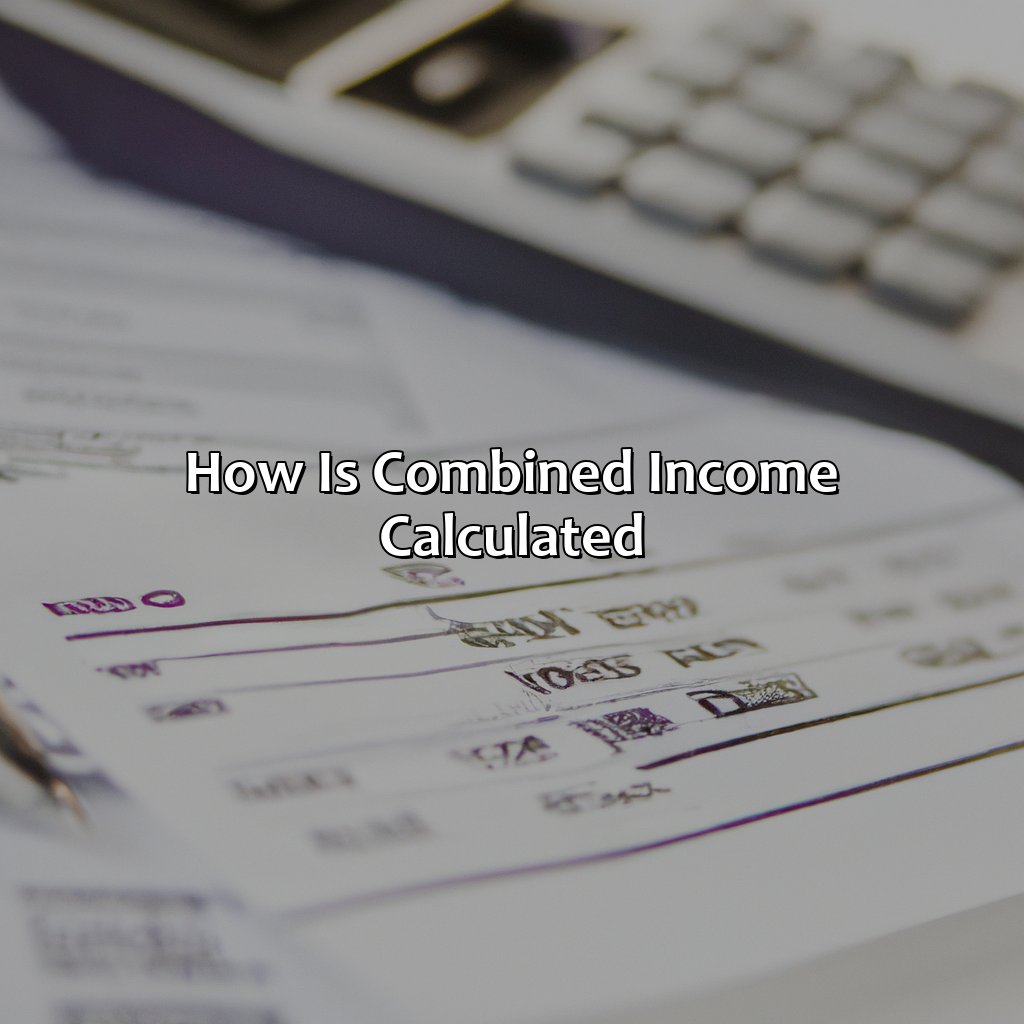What Is Combined Income For Social Security?
Key Takeaway:
- Combined Income is the total income, including wages, self-employment income, and investment income, used to determine Social Security benefit eligibility and taxability.
- Certain types of income, such as tax-exempt interest and certain pensions, are excluded from Combined Income. Calculations are based on a formula that takes into account half of the individual’s Social Security benefits and all other income sources.
- If a person’s Combined Income exceeds certain thresholds, it may result in reduced Social Security benefits. The impact on retirement, disability, and survivor benefits varies depending on individual circumstances and the level of Combined Income.
Are you trying to understand how your combined income affects your Social Security? This article will provide you with the information you need to inform your decisions. Whether you are just starting to plan for retirement or close to collecting benefits, you need to know the role that income plays in Social Security.
What is Combined Income for Social Security?
Combined income refers to the sum of an individual’s adjusted gross income, tax-exempt interest income, and one-half of their Social Security benefits. It is used to determine the taxable portion of one’s Social Security benefits, which can range from 0% to 85%. The higher the combined income, the higher the percentage of one’s Social Security benefits that will be subject to taxation. It is essential to calculate one’s combined income accurately to avoid unexpected taxes on Social Security benefits.
One can calculate their combined income by adding their adjusted gross income, tax-exempt interest income, and one-half of their Social Security benefits. If the result is between $25,000 and $34,000 for individuals or $32,000 and $44,000 for married couples filing jointly, up to 50% of one’s benefits are subject to taxation. If the result is above $34,000 for individuals or $44,000 for married couples filing jointly, up to 85% of one’s benefits are subject to taxation.
Pro Tip: Be mindful of the impact of other incomes such as pensions, IRA withdrawals, and capital gains on your combined income. Planning your income sources to minimize taxation on Social Security benefits can ensure financial security in retirement.

Image credits: retiregenz.com by Yuval Washington
How is Combined Income Calculated?
To fathom the way your blended income influences your Social Security benefits, let’s plunge into its calculation. What counts as income for Social Security and how it’s included in the computation differs. Here, we’ll investigate two subsections:
- what qualifies as Social Security income
- how Social Security combined income is calculated

Image credits: retiregenz.com by Yuval Washington
Subheading: What counts as Income for Social Security purposes?
Income that is considered for Social Security purposes includes wages, salaries, self-employment income, and other forms of earned income. Additionally, investment income, pensions, annuities, and rental income are also included. However, not all types of income count towards calculating combined income for Social Security benefits. For instance, capital gains on investments are excluded.
It’s important to note that the calculation of combined income can impact a person’s eligibility or the amount they receive in Social Security benefits. Furthermore, individuals who fail to accurately report their income may face penalties or even criminal charges. Therefore, it is crucial to understand how different types of income contribute to combined income for Social Security and to accurately report this information.
Calculating combined income for social security is like solving a math problem, but instead of numbers, you’re dealing with the government’s love for bureaucracy.
Subheading: How is Social Security Combined Income Calculated?
Social Security combined income is determined by adding together an individual’s adjusted gross income, tax-exempt interest, and 50% of their Social Security benefits. This calculation helps determine whether or not a person must pay taxes on their Social Security benefits. It also affects the amount of Medicare premiums an individual might owe. The Social Security Administration uses this calculation to determine if any benefits must be withheld. Understanding how combined income is calculated is crucial for retirees and those close to retirement age to properly plan their finances and avoid any potential surprises in taxes owed or benefit amounts received.
It is important to note that not all types of income count towards Social Security combined income calculations. Certain items such as life insurance proceeds, gifts, inheritances, and proceeds from Health Savings Accounts (HSAs) are excluded from the calculation.
In history, calculating combined income was first established by the Internal Revenue Service (IRS) through legislation enacted in 1983 as part of the previous administration’s sweeping changes aimed at making Social Security solvent for future generations. Since then, it has become a critical element in determining the taxation of Social Security benefits for millions of Americans each year.
I guess it’s true what they say, money can’t buy happiness… but it sure can impact your social security benefits.
What is the Impact of Combined Income on Social Security Benefits?
To grasp how combined income impacts your social security benefits, take a look at the following sub-sections:
- How does it influence retirement?
- How does it influence disability?
- How does it influence survivors’ benefits?
Knowing the effect of combined income on these diverse benefits can help you plan your finances better and get most out of your social security benefits.

Image credits: retiregenz.com by Joel Washington
Subheading: How does Combined Income Affect Retirement Benefits?
Combined income has a significant impact on retirement benefits received from Social Security. The higher the combined income, the lower the benefit payment recipients will be entitled to receive. This means that when someone earns money from multiple sources, including investments or employment, it can lead to reduced Social Security payments during retirement.
For individuals who have a combined income exceeding $25,000 and couples that earn over $32,000 per year, their Social Security benefits could be partially subject to taxes. The portion of benefits taxable can range from 50% up to 85%, depending on their total income level.
It is important for individuals to strategize ways to lower their combined income in order to maximize Social Security payments. One approach includes adjusting investments or timing of retirement to minimize taxes and balance out other sources of income.
Don’t miss out on getting the most out of your Social Security Benefits in retirement by actively managing your combined income and strategically planning your finances today. Why worry about being disabled when combined income can disable your benefits all on its own?
Subheading: How does Combined Income Affect Disability Benefits?
Combined income can have an impact on your disability benefits from Social Security. Your combined income includes your adjusted gross income, any tax-exempt interest, and half of your Social Security benefits. If this amount exceeds a certain limit, then a portion of your disability benefits may be subject to federal income tax.
In addition to federal taxes, some states may also impose taxes on Social Security disability benefits based on combined income. It is important to take these factors into consideration when planning for financial security while receiving disability benefits.
It is possible to reduce the impact of combined income on your disability benefits by adjusting your retirement account withdrawals or investments. Consulting with a financial advisor can help you navigate these complex issues and maximize your overall financial well-being.
One individual shared their story of how understanding the impact of combined income allowed them to make informed decisions about their retirement savings and ultimately increase their overall financial stability while receiving disability benefits.
Subheading: How does Combined Income Affect Survivors Benefits?
Combined Income can affect the amount of Social Security benefits given to Survivors. The impact of Combined Income is measured by adding half of someone’s Social Security benefits to other sources of income. If this amount goes above a certain limit, then the Survivor’s benefits may be reduced.
To clarify, if a Survivor earns money from work, investments or other sources, then these amounts are added up together along with half their Social Security benefit. This sum indicates the level of Combined Income that affects their Survivors Benefits. Once this number exceeds $18,960 per year in 2021 ($1,580 per month), it can result in a reduction of monthly payments.
Survivors who continue working after their spouse has passed away should be mindful of how much earnings and additional income they have coming in each month. Reducing work time or delaying retirement can help them avoid surpassing the threshold for Combined Income and hence protect their eligibility for full Survivors Benefits.
In summary, excess compensation may upend social security benefits especially for survivors so they should bear in mind the effects it poses before deciding to work at any point.
Five Facts About Combined Income for Social Security:
- ✅ Combined income for social security is the sum of an individual’s adjusted gross income, nontaxable interest, and 50% of their social security benefits. (Source: Social Security Administration)
- ✅ Individuals with a combined income above a certain threshold may have to pay taxes on a portion of their social security benefits. (Source: AARP)
- ✅ The Social Security Administration uses combined income to determine an individual’s eligibility for certain benefits and the amount of those benefits. (Source: Investopedia)
- ✅ Married couples filing jointly have a higher combined income threshold than single individuals when it comes to paying taxes on social security benefits. (Source: Kiplinger)
- ✅ Understanding your combined income for social security is important for retirement planning and maximizing your benefits. (Source: The Motley Fool)
FAQs about What Is Combined Income For Social Security?
What is combined income for social security?
Combined income for social security refers to the total annual income of an individual or couple, including earned income, investment income, and certain retirement income sources like pensions or 401(k) distributions. This income is used to determine the amount of social security benefits that an individual or couple may receive.
How is combined income for social security calculated?
Combined income for social security is calculated by taking an individual or couple’s adjusted gross income and adding in certain non-taxable income sources such as tax-exempt interest and income from certain retirement accounts. This total income is then used to calculate the individual or couple’s social security benefits.
What is the current combined income limit for social security?
The current combined income limit for social security is $44,000 for individuals and $88,000 for couples filing jointly. If an individual or couple’s combined income exceeds these limits, a portion of their social security benefits may be subject to taxation.
What happens if my combined income exceeds the social security limit?
If an individual or couple’s combined income exceeds the social security limit, a portion of their social security benefits may be subject to taxation. The amount that is subject to taxation will depend on the individual or couple’s specific income and social security benefit amount.
Are there any exceptions to the combined income limit for social security?
There are no exceptions to the combined income limit for social security, but certain income sources are not counted towards the limit, such as Supplemental Security Income (SSI) and Veterans Affairs (VA) benefits.
Can I lower my combined income to avoid the social security limit?
Individuals and couples may be able to lower their combined income for social security purposes by reducing their taxable income through deductions, contributing to tax-deferred retirement accounts, or relying on non-taxable income sources. However, it is important to consult a financial professional before making any decisions that could impact your retirement income.


